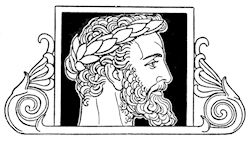Christophori Saxii Tabulae Genealogicae, sive stemmata Deorum, Regum, Principum, Virorum illustrium, qui per id tempus, quod Varroni Mythicum dicitur, vel vixisse, vel populis, a se nominatis, ortum dedisse vulgo creduntur. Ad fidem Hesiodi, A...
Plus d'informations
Folio. 27 double-page stemmata; 4 leaves. Modern boards. 41 cm (Ref: 195447107) (Condition: Tasteless modern binding. The back is soiled, and on it is written 'stemmata regum'. Book plate on the front pastedown. Small piece at the tip of the upper corner of the last leaf torn off) (Note: The German classical scholar Christoph Gottlob Sachse, 1714-1806, or Christophorus Saxius, came in 1735 to Leipzig to study classical philology. In 1745/46 he made a long tour through the West of Germany and the Netherlands, followed by his first big publication 'Lapidum vetustorum epigrammata', 1746. He decided to remain in the Netherlands, where he became the teacher of the son of De Back, the secretary to the Stadtholder of the Dutch Republic William IV, and after 1751 secretary of the grandson of Caspar Burmannus in Utrecht. In 1755 Saxius was appointed professor of Rhetoric and Greek at the University of Utrecht, which he remained until his death at the age of 92. He published much on epigraphy, archaeology, ancient history, and he produced in 1778 an edition of the 'Catonis Disticha'. Useful as they were in their time, they are now forgotten. He made one important contribution to scholarship, his 'Onomasticon literarium sive Nomenclator praestantissimorum omnis aevi scriptorum praecipue Graecorum et Latinorum', Utrecht, 1759. This biographic and bibliographic work developed into an eight volume work of reference (1775-93). It is praised by Brunet, being an 'Ouvrage d'une grande utilité pour les recherches relatives à l'histoire littéraire'. (Brunet 5,175) (On Saxius, NNBW 8, 1281/2; ADB 30 460/1) § In an epilogue, called 'Lectori Historiae veteris studioso', to this edition of 1783, Saxius explains why he produced his 'Tabulae Genealogicae, sive stemmata Deorum, Regum Principum, Virorum illustrium'. His aim is educational. He confesses that he has learned from long experience, that students doze off listening to dull voices and lectures, but that they revive when shown something more concrete. He condemns teachers who are not willing to explain matters with the use of maps, so reducing the appetite of their pupils. The easiest way to avoid errors is to visualize and so elucidate complicated matters on tables, on which all information is available in brief at one glance. Saxius used this recipe for the confusing assembly of Greek and Roman gods, kings, royal families, peoples etc. The 27 double-page tables contain: 'Genealogiae Deorum tabula' 1, 2 & 3; 'Regni Thessalici tabula', 1,2,3,4 & 5; 'Regnum Argivum tabula' 1,2,3 & 4; 'Regni Spartani tabula' 1 & 2; 1 table 'Regnum Sicyonium & Regnum Messenium', 1 table 'Regnum Arcadicum', 1 table 'Regnum Elidis & Pisaeorum, item Regnum Corinthiacum', 'Regni Attici tabula' 1 & 2, 1 table 'Regnum Thebanum', 1 table 'Regnum Troianum', 1 table 'Mantissa stemmatum aliorum quorundam Regum, tamquam Regum Iudaicorum & Israëliticorum', 1 table 'Regum Macedoniae ante & post Alexandrum Magnum', 1 table 'Regum Aegyptiorum post Alexandrum Magnum', 1 table 'Regum Syriacorum post Alexandrum Magnum', 1 table 'Principum Hasmonaeorum', 1 table 'Stemma Herodiadum, ad fidem Librorum divinorum Novi Foederis, & Iosephi inprimis concinnatum') (Provenance: The 'art deco' bookplate: 'Ex libris Luciani v. Römer'. Depicted are the Roman she-wolf, with Romus & Remulus. This book once belonged to the Dutch physician, botanist and writer, and pioneer fighter for gay rights, Lucien Sophie Albert Marie von Römer (1873-1965). He often wrote about homosexuality, and argued that it was an innate characteristic. He practiced medicine in the Dutch East Indies (later Indonesia) in his later life. His views parallel those of psychiatrist Sigmund Freud on this topic. Lucien von Römer was born in 1873 in Kampen, Overijssel. He studied medicine at Leiden University and the University of Amsterdam, and received his medical license in 1903. He went on to practice as a neurologist. Von Römer was particularly interested in homosexuality, and worked in Berlin with the prominent sexologists Magnus Hirschfeld and Albert Moll. He was a regular contributor to Hirschfeld's journal, 'Jahrbuch für sexuelle Zwischenstufen' (Journal for Sexual Transitions); his first article, a profile of King Henry III of France, was published in 1902. In addition to homosexuality, Von Römer also wrote for the 'Jahrbuch' about androgyny, hermaphroditism and the reception of Arnold Aletrino's works. In 1908, he published an anthology of Friedrich Nietzsche's writings on homosexuality in Hirschfeld's 'Zeitschrift für Sexualwissenschaft'. In the same year, he submitted a postdoctoral dissertation that argued that homosexuality was innate, but it was rejected by the University of Amsterdam on the grounds that it was 'in conflict with morality and offensive to others'. Von Römer left the Netherlands and joined an expedition to New Guinea as a botanist in 1910. He discovered numerous plants on the expedition, some of which were named after him. He settled in the Dutch East Indies in 1913, where he worked as a public health specialist and a regional government physician. In 1921, he married Eugenie Gallois, a pianist, and had a son. After retiring, he continued to practice psychiatry in Malang in Indonesia, where he died in 1965 at the age of 92. (Source of Von Müller Wikipedia, the Dutch version has more than the English version; but see also Wikipedia's article: 'Nederlandsch Wetenschappelijk Humanitair Komitee') (Collation: 54 leaves not signed, followed by 4 leaves all signed x0x; the 4 leaves consist of 1 leaf 'Lectori' and a 3 leaf index)) (Photographs on request)

